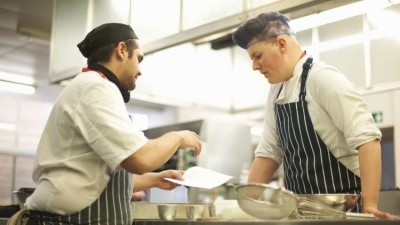Sustainability 'solution to crippling overheads'

Speaking at the MA Leaders event in Brighton, East Sussex on Thursday 15 September, Heppner said the energy crisis was an “enormous problem” which wasn’t “going away” anytime soon but that sustainability could be the solution amid “crippling” overheads.
He added: “Operators are facing all sorts of head winds. But now is not the time to let sustainability fall away, it can be the answer to these challenges.
“We’ve got to do all we can to make our business energy efficient to manage these costs.”
According to Heppner, pubs can help reduce energy costs by implementing simple measures such as turning off heating, lighting, kitchen equipment, ventilation, and extraction overnight.
Furthermore, Heppner stated maintenance was the “biggest opportunity for saving”, with regular cleaning of things like ventilation systems making them 25% more efficient.
Visible badge
While well fitted gaskets and seals on oven and fridge doors could reduce consumption by up to 10% with poorly maintained cellar chillers using 25% more energy, costing operators in excess of £500.
Heppner also explained solar panels were well worth investment for licensees as, while they may cost some £12,000 to install, they generate c8kwh per year and could save pubs around £4,000 a year.
Not only this, but they also act as a “visible badge you are doing the right thing”.
He added: “Solar panels are demonstrable evidence of the business trying to do what it can to address climate crisis.”
Additionally, Heppner added managing food waste is another tool for businesses to show staff and consumers they are doing their bit.
This was echoed by Emmy Van Beek, growth and development lead for the Sustainable Restaurant Association, who also spoke at the conference.
Putting money in the bin
Beek explained the food service sector wastes on average around one ton of food per year, 75% of which is avoidable, and encouraged operators to “make changes”.
She said: “Food waste is often seen as a by-product of operations, when you start to measure it and reframe it in your mind, food waste becomes a lot higher up on the agenda.
“When you start to think about food as the money you are throwing away and paying waste managing companies to take away, that’s when we think about it slightly differently.”
Beek said pubs should start by looking at what is consistently being sent back by customers on their most popular dishes, stating one high street pub chain noticed tomatoes were frequently being sent back on its breakfast dishes and decided to, keeping the price of the meal the same, remove it as a standard and offer as a free of charge add-on.
This, according to Beek, saved 6.5m tomatoes a year, equating to a saving for the company of roughly £650,000.
She added: “Look at your bins, pinpoint something to take action with.
“By not addressing food waste you are literally putting money in the bin and paying someone to take it away.”







